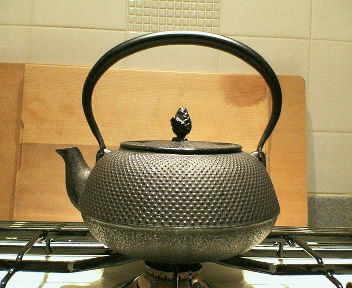My cell phone was doing some weird things lately, and Atsushi pointed out that the inside of the tea kettle was getting corroded-looking; so I decided to use some errand time yesterday to get new ones. When I described the afternoon to Atsushi later, he laughed. “You’ve been contending with both the ancient and the modern today, huh?”
The kettle we had before was a regular aluminum job with a whistle–the sort of thing you buy when you’re just moving into your first apartment and prioritize speed of acquisition over aesthetics. But while I was getting a new one, I figured I’d go for a 鉄瓶 (tetsubin: lit., “iron vessel”, though the 瓶 part usually refers to bottles nowadays). A tetsubin is a traditional kettle for boiling water. I thought about looking through the catalogue at Seibu for one with an offbeat design, but when it’s something as elemental as boiling water, it’s kind of nice to go for the standard-warhorse model, so I did:

The good thing about an iron kettle is that, used over an open flame, it establishes an uncanny connection with our prehistoric ancestors, who had direct contact with fire, water, and mineral in slowly advancing out of subsistence on the raw provisions of nature.
The bad thing about an iron kettle is that it is a total pain in the ass to take care of–as I’d forgotten, not having used one for years, but quickly relearned yesterday. Those who care for their favorite old cast iron pans without a lot of huffing and puffing may wonder what I’m complaining about, but thing with a frying pan is, usually if you leave it sit for a while before cleaning it, all it has in it is grease. As long as you clean it before the contents go rancid, you’re pretty much fine. You can’t let water sit in a kettle, though, because it’ll start rusting almost immediately. It’ll also start rusting if you leave it wet, which is why you have to be sure to empty all the water and, while it’s still hot, wipe around the spout and lid, where condensation is especially likely. (The instruction packet says, “Be careful not to burn your hands in the process.” Yeah, no freakin’ joke!) That means that if you’re going to make a quick cup of tea before taking off in the morning, you need to factor in an extra 30 seconds or so.
The other thing you have to do, of course, is season it. So yesterday, while I was sitting hunched over my frighteningly competent new cell phone, I was also boiling kettlefuls of water and then dumping them. When they ran clear, it was ready to use. It took about an hour all told (for Tokyo, we have a very satisfyingly gusty set of gas jets).
Not so the cell phone, and it wasn’t just because I was an overgrown boy playing with a new mechanical toy, though that was mostly it. The resolution power for both camera and display screen is unreal; I cropped one of my favorite pictures of Atsushi and set it as his…uh, what would we call it in English? 着信画面. Incoming call screen? I’m used to phones with good displays–this is Japan. But I haven’t bought a new model for three years or so, and I’m still not quite used to it.
The ring tones are a trip, too, since phones now have their miniature version of surround sound. I went to one of the sites with Western pop music and looked at a few of the offerings. Eclectic doesn’t begin to describe it; I made a beeline for the Tracey Ullman version of “They Don’t Know.” (Was that a hit in Japan? Do people remember it? I wonder. I don’t think I’ve ever seen it in a karaoke book, but I wasn’t looking, either.) It doesn’t really apply to Atsushi and me very well–our friends kept trying to push us together and were frankly exasperated at the stately pace at which we courted each other, actually–but it’s a very sweet tune to use to signal that your love is calling, so I programmed it in.
What isn’t sweet is the fact that all the functions–the diacritical marks for kana, the delete button–are in different places. I asked at the shop whether going with the same manufacturer as my old model would help, but the saleswoman said National-Panasonic’s moved everything around. It took me twenty minutes to type a four-line e-mail to Atsushi today. At least I haven’t hung up on anyone, or anything.
